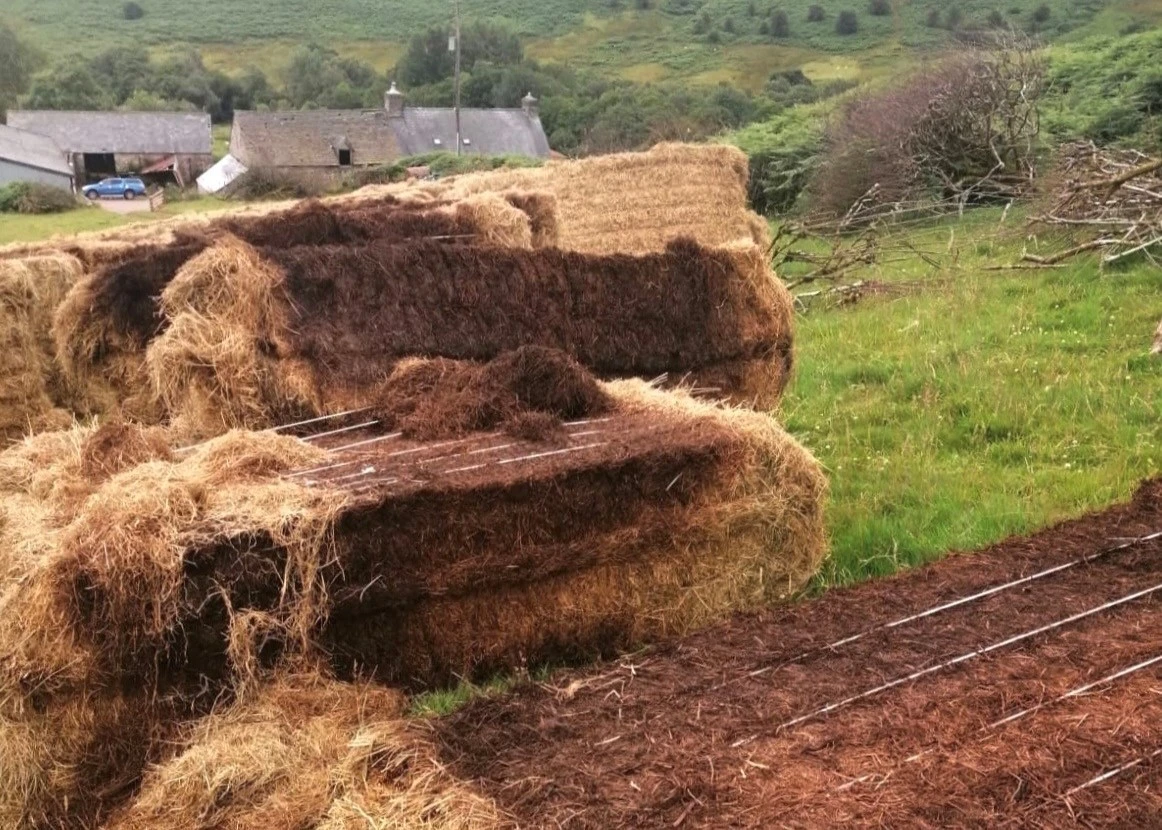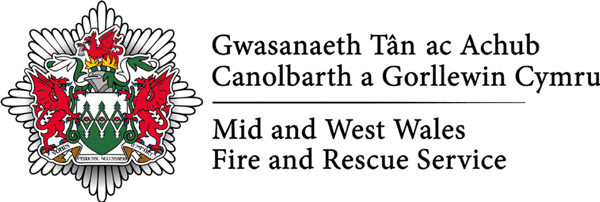On Wednesday, July 24th, Mid and West Wales Fire and Rescue Service’s (MAWWFRS) Farm Liaison Officer, Jeremy Turner, attended a farm in Builth Wells as they had a large quantity of hay bales with dangerously high temperature readings.
Visiting the farm with his bale stack tester and thermal imaging camera, Jeremy met Mr and Mrs Jones on the family-run farm and discussed the numbers of bales currently being stored and the timeframe of when the bales were baled and how long they had been stacked in storage. During Jeremy’s visit, the sweet sickly smell associated with overheating bales was noticeably present across the farm’s yard.
During a closer inspection of the bale stack, which consisted of approximately 60 large square hay bales, there were clear signs of overheating such as sagging in the centre of the stack, some bales beginning to break down and moisture around the gaps between bales which included wetness, mould and fungi. While viewing the stack through the thermal imaging camera, hot areas around the gaps in the bales were identified with temperatures in excess of 36°C.
While testing the bales with a probe, Jeremy found that the stack was at critical risk of spontaneously combusting due to temperature readings between 95-100°C – the highest temperatures he had ever recorded.
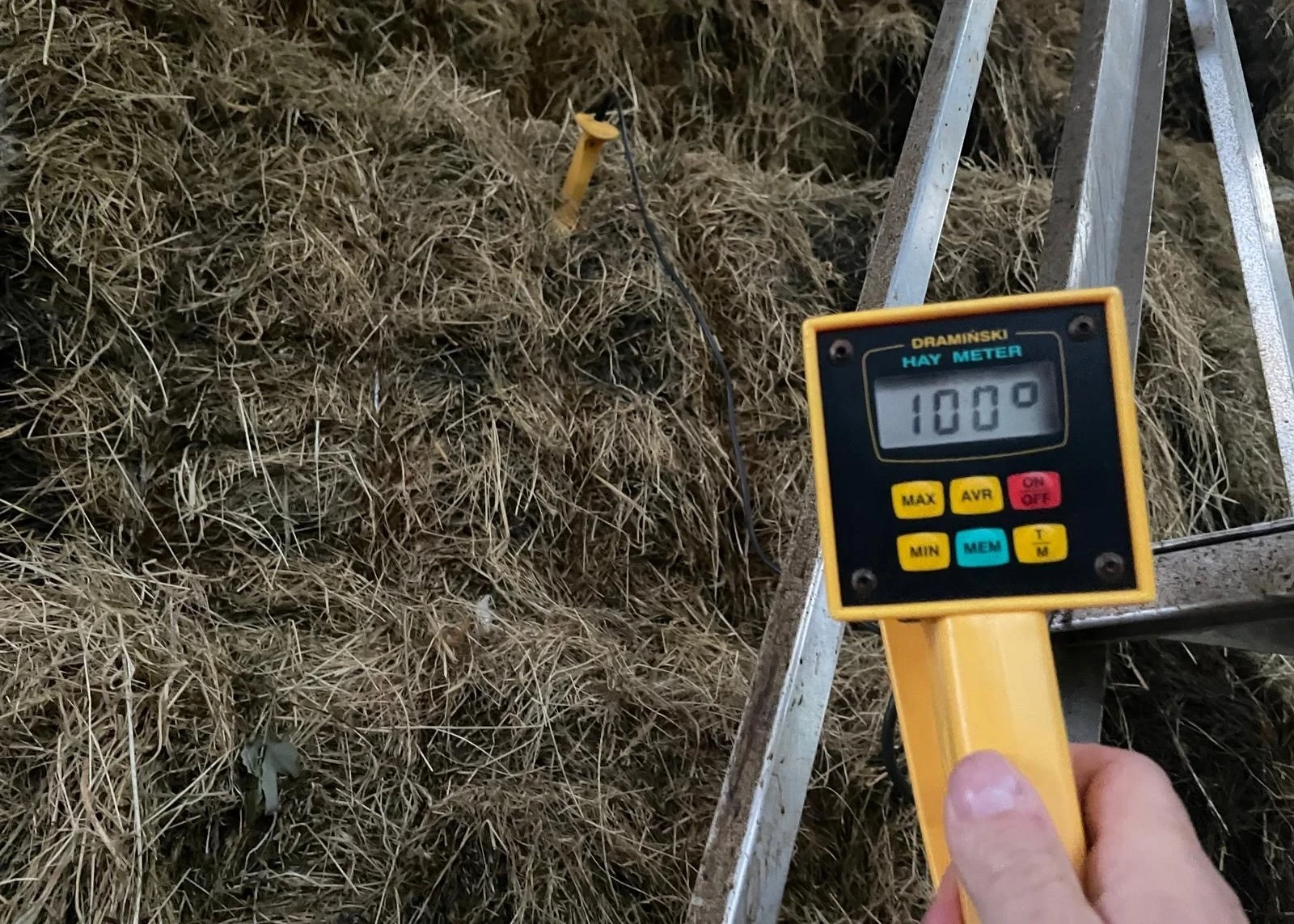
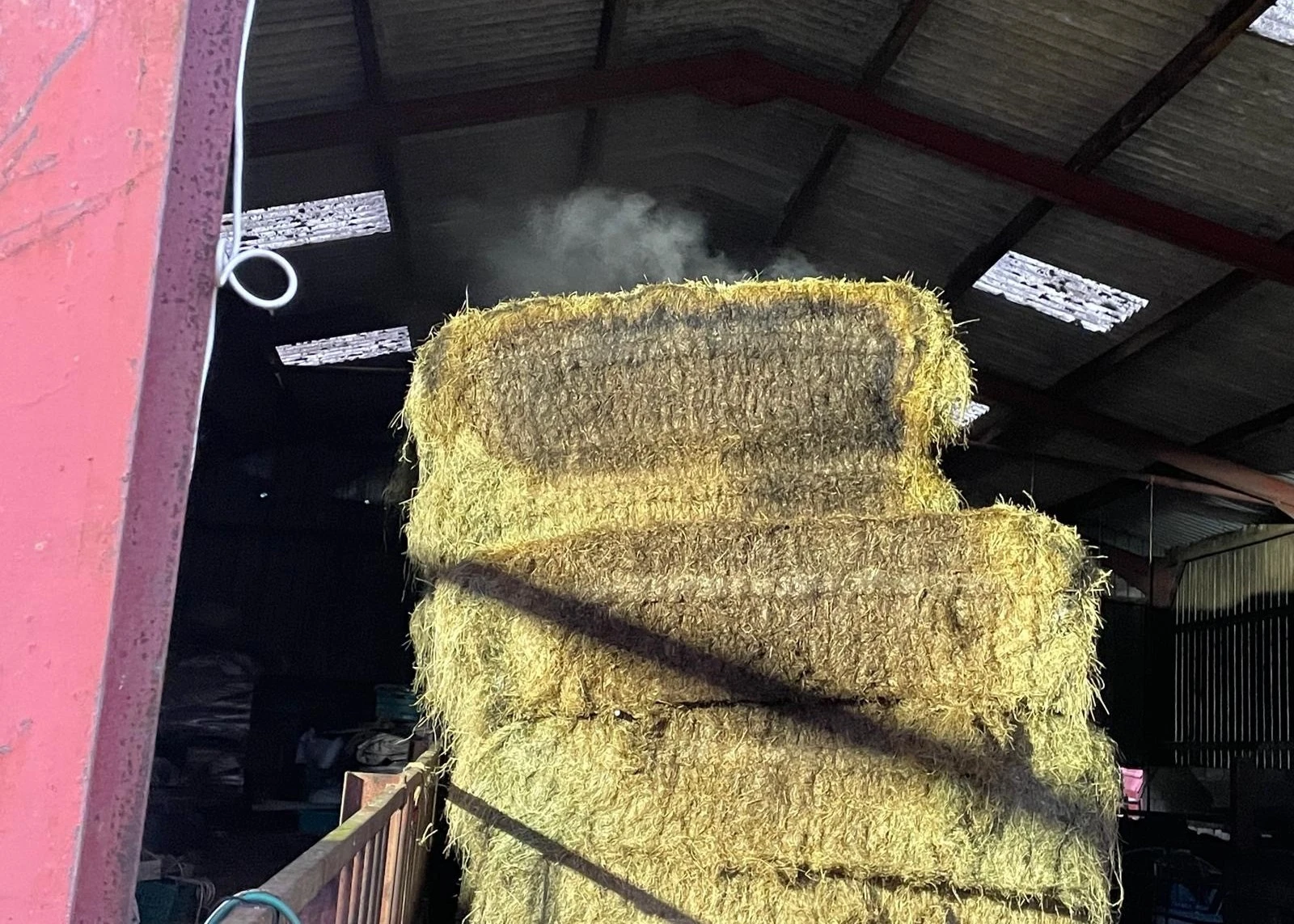
It was decided that the bales would need to be removed from the building they were being stored in and due to the risk of the bales bursting into flames as they were being removed, and the farm’s remote location, two fire trucks and a water bowser were requested to attend as a precaution. Once the vehicles had arrived and all equipment had been set up, the farmers began removing the bales from the barn and placed them in a nearby field under the supervision of MAWWFRS crew members who were equipped with charged hose reel jets. Thankfully, despite large plumes of steam coming from the bales during their removal, none of them ignited.
Having successfully removed the bales from the barn, Jeremy was informed of another nearby farm, owned by the same farmer, that had a larger stack of bales that had been baled and stored around the same time as the one at this address. After travelling to the other farm and testing the stack, concerns were raised over its high moisture content of 80% and maximum temperature readings of 97°C – which were well in excess of the safe parameters of 35°C or less and a moisture content of 22% and below. Crew members and the farmer proceeded to carry out the same procedure as was used at the first farm where bales were removed under the supervision of firefighters with hose reel jets.
Speaking at the incident, Farm Liaison Officer Jeremy Turner said:
“I have no doubt that without the diligence of the farmer and steps taken subsequently that this would have resulted in two large barn fires, which would have been hampered by their remote location, limited access and lack of water supplies on-site. MAWWFRS has seen an increase in the number of barn fires across our Service area recently, which has most likely to be a result of the short spells of fine weather which has limited the windows of opportunity to make suitably dried hay. This has led farmers to carry out ‘snatch harvests’ and we often find that hay stored with a higher moisture content will show signs of overheating between 4-6 weeks after being stacked. I would urge all farmers to keep a close eye on their bales, especially during this timeframe, and to contact MAWWFRS to request a FREE bale temperature check if they have any concerns that their bales may be overheating.”
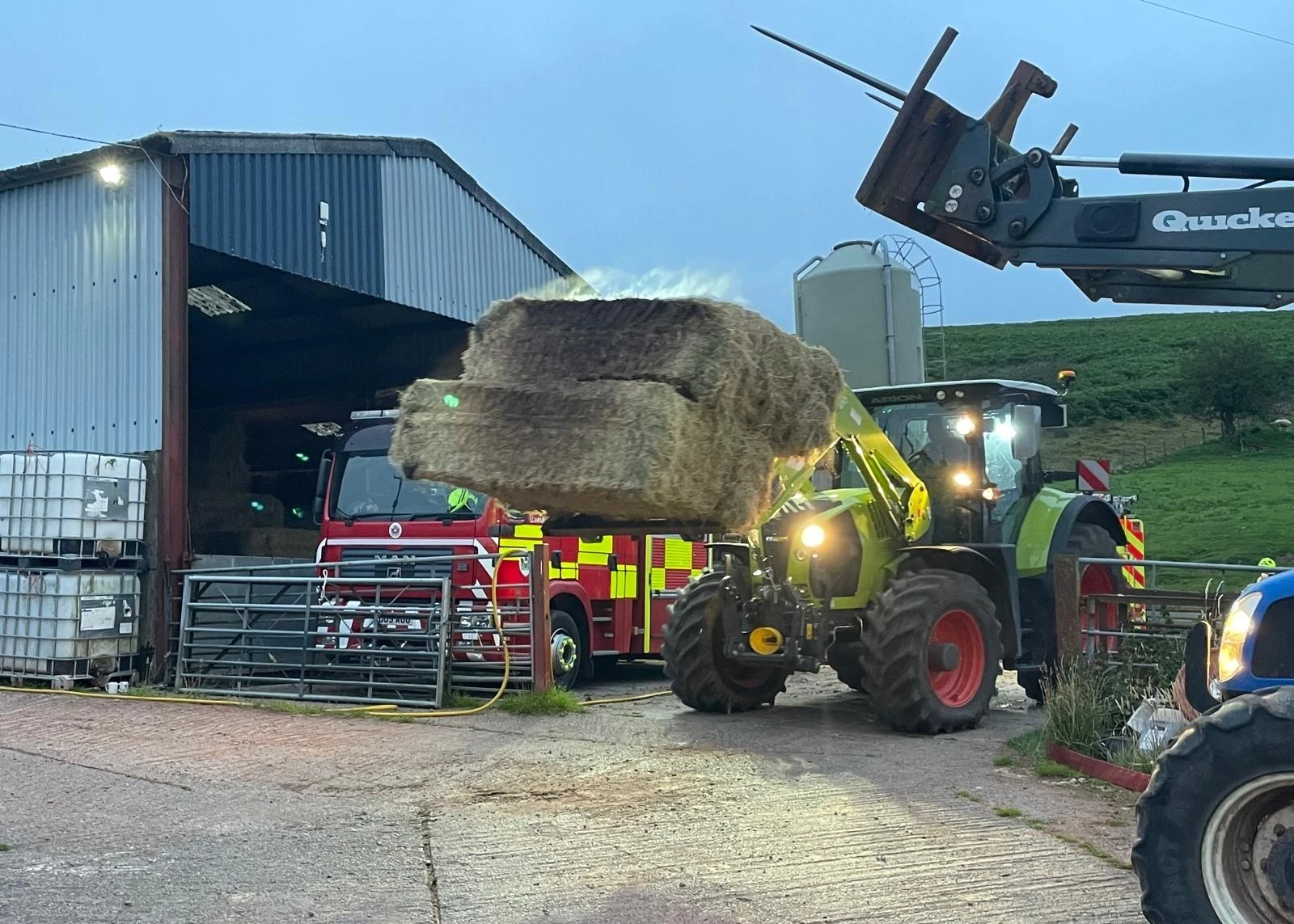
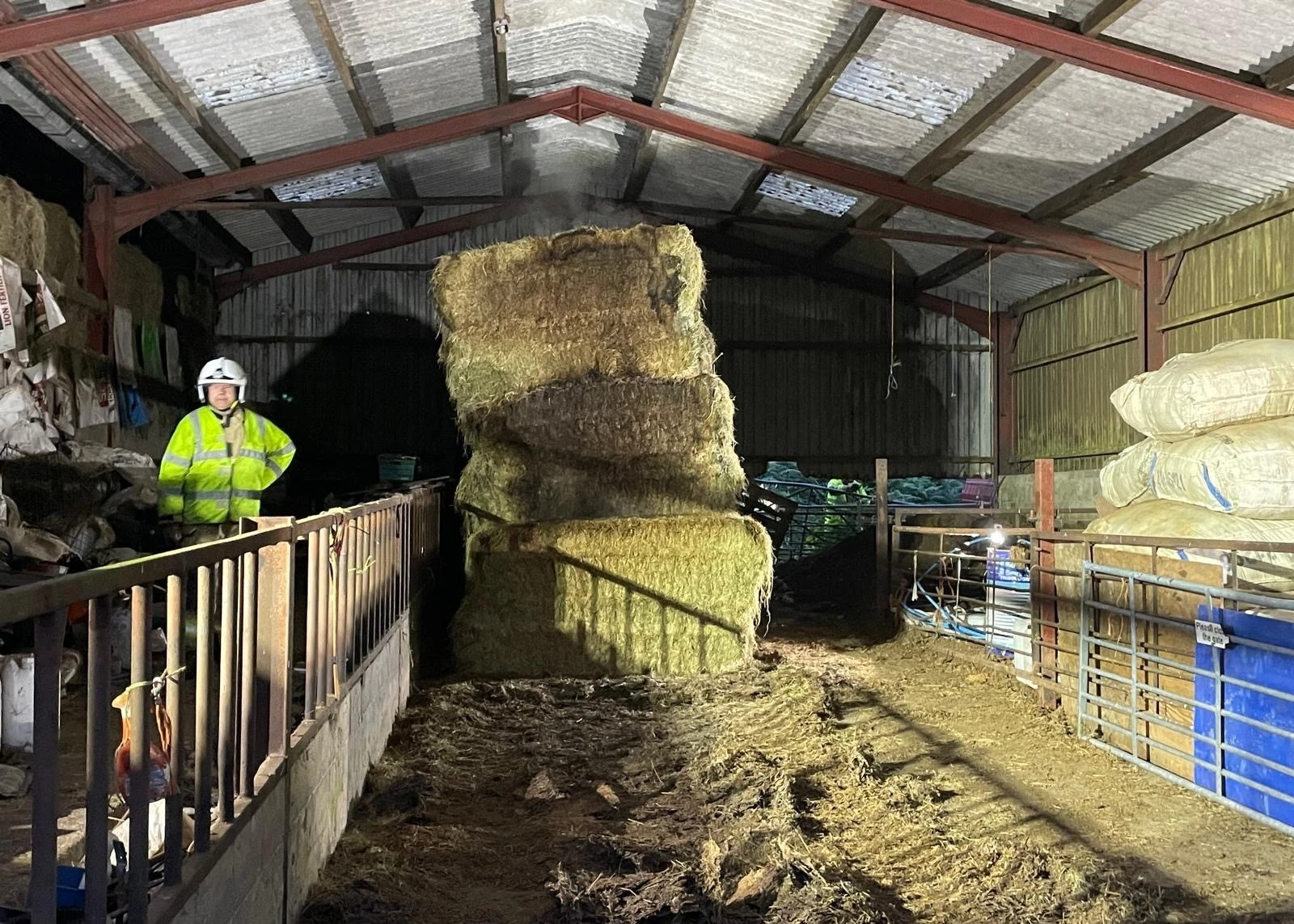
Farm Fire Safety
A large proportion of Mid and West Wales Fire and Rescue Service’s area is home to a tapestry of rural and agricultural communities. Following this incident, MAWWFRS is issuing a farm fire safety reminder and advice to members of the farming communities:
- FREE Bale Temperature Testing Service
MAWWFRS is pleased to offer a FREE Bale Temperature Testing Service. If you have concerns regarding the temperature of your bales, please contact us to request a check of the temperature and moisture content of the bales, using specialist equipment. Depending on the readings we receive, we will then work with you to formulate a plan to manage the associated risks. To book a free visit, please call 01268 909408 (line is open 24/7).
If bales are smouldering or on fire call 999 immediately. - Stored bales must not have a moisture content greater than 22%.
Bales that have a moisture content of 22% or higher pose a risk of increasing in heat once stacked, leading to overheating and possible spontaneous combustion. - The temperature of bales should be checked before being brought off the field for storage.
Bales with a temperature above 35°C can maintain their own heat generation to a point where spontaneous combustion can occur. - Bale Storage Advice
Where possible, stacks should be sited separately, away from other farm buildings, especially livestock buildings. Keep stacks to a reasonable size, well apart and dry. Avoid storing fertilisers, chemicals, gas cylinders, tractors and other machinery in barns containing bales. Ensure that all electrical equipment and wiring is well-maintained.
If bales are smouldering or on fire call 999 immediately. - Signs of bales overheating
Signs of bales overheating may include discolouration or browning in some areas, stacks seen to be ‘steaming’ early in the morning or late evening, the presence of a sweet, sickly smell and hay turning to a tobacco-like form.

